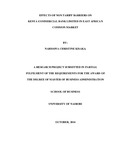| dc.description.abstract | The banking industry in Kenya has been on the upward trend in terms of growth and development. This
has led to an increase in the number of banks in the country and opened an environment for serious
competition. Kenya Commercial Bank being one of the leaders in the market has not been left out in the
competition. The bank has managed to expand its network not only in Kenya but also in the entire East
African region. The East African Community (EAC) is a regional organization mandated by the
Governments of Kenya, Tanzania, Uganda, Rwanda and Burundi to spearhead the East African economic,
social and political agenda. The treaty for the establishment of the EAC was signed in November 1999
and entered into force in July 2000. The treaty sets out a bold vision for the eventual unification of the
EAC Partner States. It sets a Customs Union (CU) as the first step of integration. Kenya Commercial Bank
has been benefiting from the integration and growth momentum in the East African Community (EAC)
which has become one of the most vibrant economic regions in the world. However, despite impressive
increases in trade between the five EAC partners in recent years, there is still a large untapped potential.
EAC trade could increase several-fold if unnecessary restrictions in trade-particularly non-tariff barriers
(NTBs) were removed. Despite being one of the leaders in the industry, the bank has not been exempted
from the challenges resulting from NTBs. The study sought to establish the effects of NTBs on Kenya
Commercial Bank Limited in East African Common Market. The study adopted a case study approach.
Qualitative data was collected from Head of Trade Services in Kenya Commercial Bank Head Office,
Nairobi and was analyzed by use of content analysis. The research findings indicate that Kenya
Commercial Bank benefits from the Common Market as there is free movement of all the factors of
production such as people capital, goods, labour and services across borders and as result boosted the
trade and investment and made region more competitive and productive. There is also free movement
of workers between Kenya and Rwanda and it only takes 30 days for citizens to be given work permits.
However, there are plans for citizens to start using their national identity cards as travel documents in
bilateral arrangements that seek to motivate other EAC members to drop the use of passports. The
findings also indicate that Kenya Commercial Bank also partnered with Visa and launched its MeCash
prepaid card to allow users to make payments with more ease and to allow its customers to manage
their finances by eliminating the need to carry cash. Furthermore, the findings indicate that Kenya
Commercial Bank has regional business continuity blue print as a way of safeguarding its customers and
regional business. KCB signed a Memorandum of Understanding with Uganda’s Kenswitch, Rwanda’s
Rswitch, and Tanzania’s Umoja. Its goal is to expand the entire African continent and move towards
having a cashless economy. There is also the aspect of Real Time Gross Settlement system (RTGS), where
settlement is made within a day as compared to the previous two or three days taken to receive money.
The findings also indicate that Non-tariff barriers are said to | en_US |

